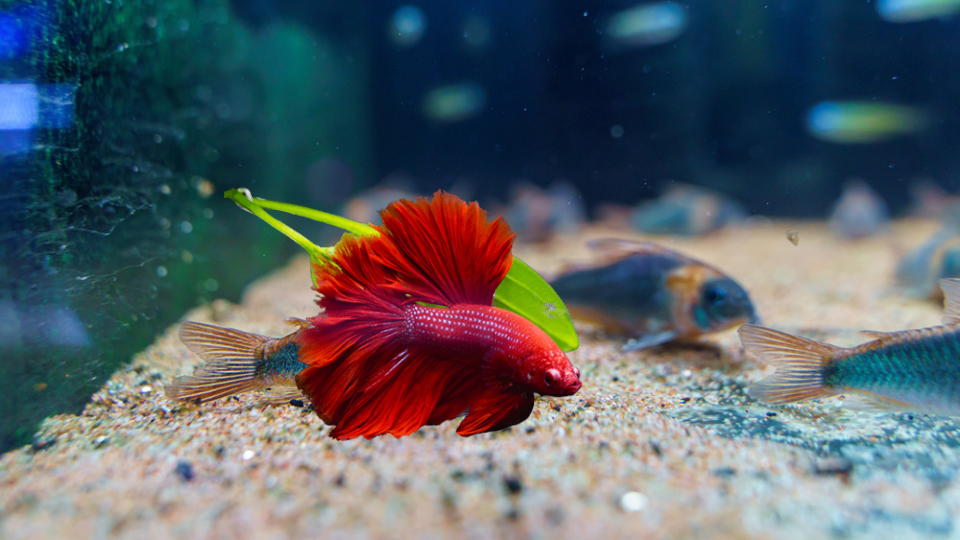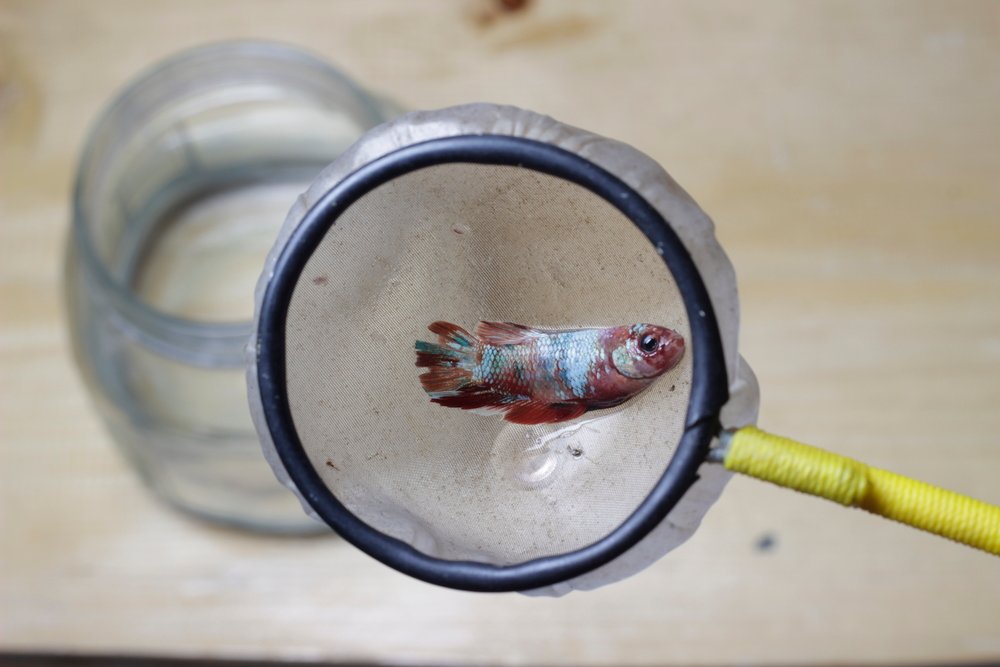How Long do Betta Fish Live? (+ How They Can Live Longer)
Discover the truth about betta lifespan and what causes these fish to die. How old do bettas get? What are the factors that determine their lifespan?
These are all critical questions to a new betta parent. Join us and uncover the mystery. Learn how to keep your betta swimming strong for years to come.
We’ll debunk some myths and misconceptions about betta behavior, like whether or not they really “play dead” or if a snail can kill them. And we’ll also uncover the truth about what can go wrong in a betta’s life and how to spot the warning signs when your fish is on the verge of dying.
So get ready, grab your diving mask, and let’s jump deep into the world of betta fish lifespan and adventure you won’t want to miss!
How Long Do Betta Fish Usually Live?
How long betta fish live? The average betta fish lifespan is 3 years, but in captivity, they can live up to 5 years, sometimes up to 10 years.
The lifespan of a betta depends on many factors, such as diet, tank size, genetics, water quality, and overall health and stress levels.
Like humans, fish also need a nutritious diet to grow old healthily. They can also get sick if they live in dirty conditions, so keeping the water clean and maintaining optimal conditions are vital for any betta owner aiming for a long life for their pet bettas.
You can reduce the betta’s stress levels by keeping bettas in solitary tanks or having only passive and non-threatening tank mates. Also, give it many hiding spots to relax when it doesn’t want to be swimming out in the open.
Monitor its behavior and health and address any problems quickly. If you follow these guidelines, you can improve the chances of significantly extending the betta’s life.
Do Betta Fish Float or Sink When They Die?

Once a betta dies, it will most often sink to the bottom as they are denser than water. Once dead, the fish’s bladder starts dissipating, causing them to fall to the bottom and not float. But there may be many reasons that a betta sinks to the bottom, and it doesn’t necessarily mean it’s dead or will die.
However, if the betta floats on the top near the surface and is dead, it has been dead for a while, and the gas from bacteria has built up in the body, causing it to float. You may have seen news reports about bloated whales washing up on shores, full of gas and ready to explode. But if the fish floats and is alive and seemingly struggling to swim down, it may suffer from swim bladder disease.
Do Betta Fish Play Dead?
Some Siamese fighting fish owners believe their bettas can “play dead,” but this is not their intention.
Bettas may seem like they play dead by swimming upside down near the tank’s surface. But in fact, it’s only a weird behavioral trait that they express, which we humans interpret as playing a trick on us. In reality, it may be a defense mechanism,
There are a few things we should understand about this behavior. First, the fish often sink when it’s dead but may float at the surface if they have been dead for a while. Second, the fish does not have big enough brains to have thoughts and intentions to fool humans by coming up with ways to “play dead” and most likely doesn’t even understand the concept of death.
Suppose these tropical fish swimming upside-down near the surface is a defense mechanism by looking dead like a rotting corpse, making it unappealing to predators. In that case, it is doing so purely by instinct.
By learning about betta fish care and regularly checking your betta’s behavior and appearance, you should be able to distinguish between how they look when resting, if they are acting abnormal, like having an illness or being injured, or if it’s dead. Hopefully, you will have time to save it before it’s too late.
How Do Betta Fish Die, and How Do You Know If Your Betta is Dying?

Like us humans, most bettas die from illness or old age if their living conditions are good. After its short life of a few years in the fish tank, it may start looking weaker, slower, and showing signs of either old age or disease.
Signs to look out for are appetite loss, lethargy, bloating, reduced swimming activity, and any changes in their behavior or appearance may be a reason for concern. It would be best to examine the underlying causes to ensure it doesn’t suffer from illness or unhealthy water conditions.
You can help your betta live longer by understanding its needs and giving it the ideal habitat. But if its time has come, or it seems to be in pain from old age or an incurable disease, humane euthanasia could be the best option for a compassionate way to end its life.
Can a Snail Kill a Betta Fish?
If you’re considering introducing a snail to the community tank, they can often be great tank mates without conflicts. But can a snail kill a betta? Yes. Adding a snail is not without its risk. In most cases, it will be fine, but in some cases, it is harmful to the betta, especially if the snail is carrying parasites or a disease that could infect your fish.
Some snails also grow more prominent than you expect, and some species reproduce very quickly, which can overcrowd the tank or worsen the water quality.
Some people prefer to quarantine new snails or other animals before introducing them to the tank and observe it over time to reduce the chance of lumping a sick or infected snail in the tank with your healthy betta.
Can a Filter Kill a Betta Fish?
Not to make you paranoid, but there are a few possible scenarios where a filter can kill your beloved betta fish:
- The filter’s intake tube can pull and trap the fish if the water flow is too strong. The suction can cause significant distress and suffocate the fish.
- The filter is clogged while you are unaware of it, which worsens the water conditions in the tank, and the habitat becomes toxic or unhabitable, slowly killing your betta.
- Gross negligence or failure to maintain the filter causes a buildup of waste, harmful bacteria, and pollutants in the water, which doesn’t go away by itself and makes your fish sick.
If you have a filter in your tank, ensure that the current is not too strong, set it up correctly following the manufacturer’s instructions, and clean and maintain it regularly. Also, monitor water conditions to ensure it’s working well and adjust if it doesn’t. A great pet betta owner sets the perfect conditions to maximize its chances of staying healthy and safe in its environment.
How to Not Kill Betta Fish and How to Make Bettas Live Longer

Don’t kill your betta! Providing the utmost care and maintenance is essential to keep them healthy and happy. To achieve this, you can follow these guidelines about how to make your betta live longer:
- Provide a larger tank: A 10-gallon tank can provide more space for your betta to swim and live comfortably, increasing betta’s lifespan to live as long as possible.
- Maintain the right environment: Keep temperature, pH levels, and other water conditions suitable for betta fish to survive.
- Change the water regularly: Frequent water changes help keep the water clean and healthy.
- Use a filtration system: Especially in larger tanks with a lot of life, it helps to remove waste and toxins from the water.
- Check the water conditions: Monitor the water’s pH levels, temperature, and quality to ensure that the fish tank’s habitat is ideal.
- Avoid distress and sudden changes: Reduce stress by keeping them in the same tank in stable conditions. A betta can experience temperature shock if there are sudden temperature changes, causing great distress, making it more prone to illness, or even killing it.
- Avoid conflict and stress: Other tank mates, even if those mates are docile, can threaten their territory and cause anxiety or aggression in male bettas. Especially other male betta fish cause the most aggression. If you want a betta to live long, keep it alone or with non-threatening animals like snails, shrimps, or bottom-dwellers that don’t resemble themselves (fish with long fins and bright colors)
- Acclimate your betta correctly: If you move your fish to a new tank or change the water, you must always acclimate it gradually to avoid unnecessary stress.
- Feed a nutritious diet: Like humans, fish need a varied and healthy diet to live long. Please don’t give it human food, but buy proper betta fish food from the pet store that the fish likes.
- Monitor their health: Regularly check in with your betta’s behavior and appearance. Look out for disease symptoms or old age signs, such as less activity and low appetite, which may indicate that they are near the end of their life.
- Keep it happy. Happier fish live longer. Create a tank environment worth living in: introduce live plants, upgrade to 10 gallons, and separate female bettas, and your bettas can live a long fish life.
These simple steps can help your betta live a long and healthy life.
Will Tap Water Kill Betta Fish?

Tap water can contain chemicals and pollutants that may harm bettas, even if it’s entirely safe for humans to drink. For example, chloramine does not evaporate from the water as chlorine does. Another pollutant is lead, mercury, and metals from pipes.
If a fish owner intends to use tap water as the source for their tank water, they should be cautious and let the water sit to make the chlorine evaporate, and use a water conditioner that removes the bad stuff. Also, they should take the extra step and test the water quality to ensure its safety, which includes measuring pH, ammonia, nitrate, oxygen, and more. When water measurements are perfect, you may assume the water is healthy for your betta. But if you want to avoid taking the chance, you can always buy betta-specific water from the aquarium store. It’s more expensive, but you don’t have to worry about the water quality.
What Will Kill a Betta Fish?
If a betta dies, there can be a million possible causes. The most common ones are illness and poor water quality, and others are improper diet, stress from overcrowding, injuries from fighting, infections, toxins, harmful chemicals, and old age.
How to Humanely Kill a Dying Betta Fish
If your betta is suffering from an illness that it can’t recover from or is obviously at the end of its life and clearly in pain, a sympathetic owner may want to relieve it by ending its life and sending it to fish heaven.
The most humane way of killing a dying betta is through euthanasia solution. Here are two kind-hearted ways of departing with your betta by putting it out of its misery:
- Getting a euthanasia solution from your local aquarium store or veterinarian is the best way.
- Clove oil. Experts say this is a very effective way of euthanizing a betta because it slows down the fish’s breathing until it stops. It also has an anesthetic effect, making it calm and peaceful in its departure from this life.
- Baking soda. A less humane way of doing it, but still merciful, is baking soda or sodium bicarbonate. When you release baking soda in water, it releases CO2 and depletes the oxygen, causing the fish to suffocate.
Please have an expert or veterinarian administer and perform this procedure as they know what they are doing and minimize the risk of messing up and causing additional suffering.
It may be difficult to contemplate killing your pet, but it can also give you peace from the pain you feel seeing it suffer. Parting with your betta fish and doing it with the utmost care and love is the best you can do in your situation.

